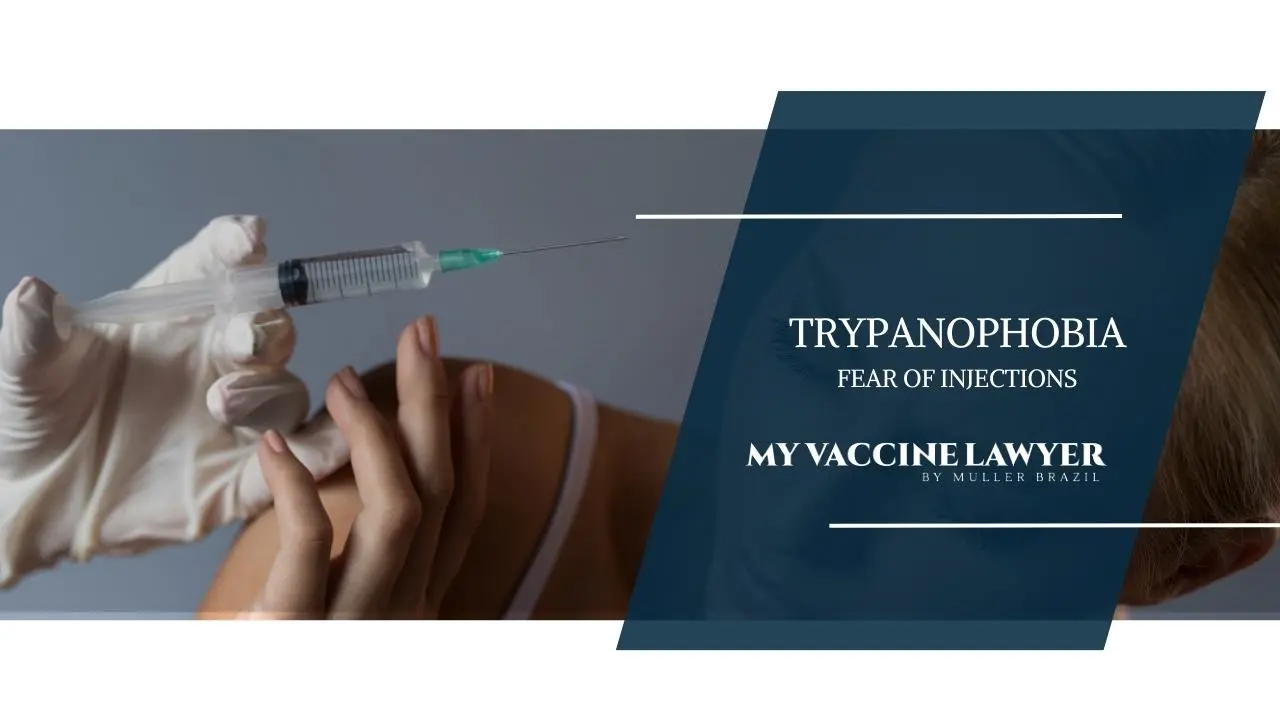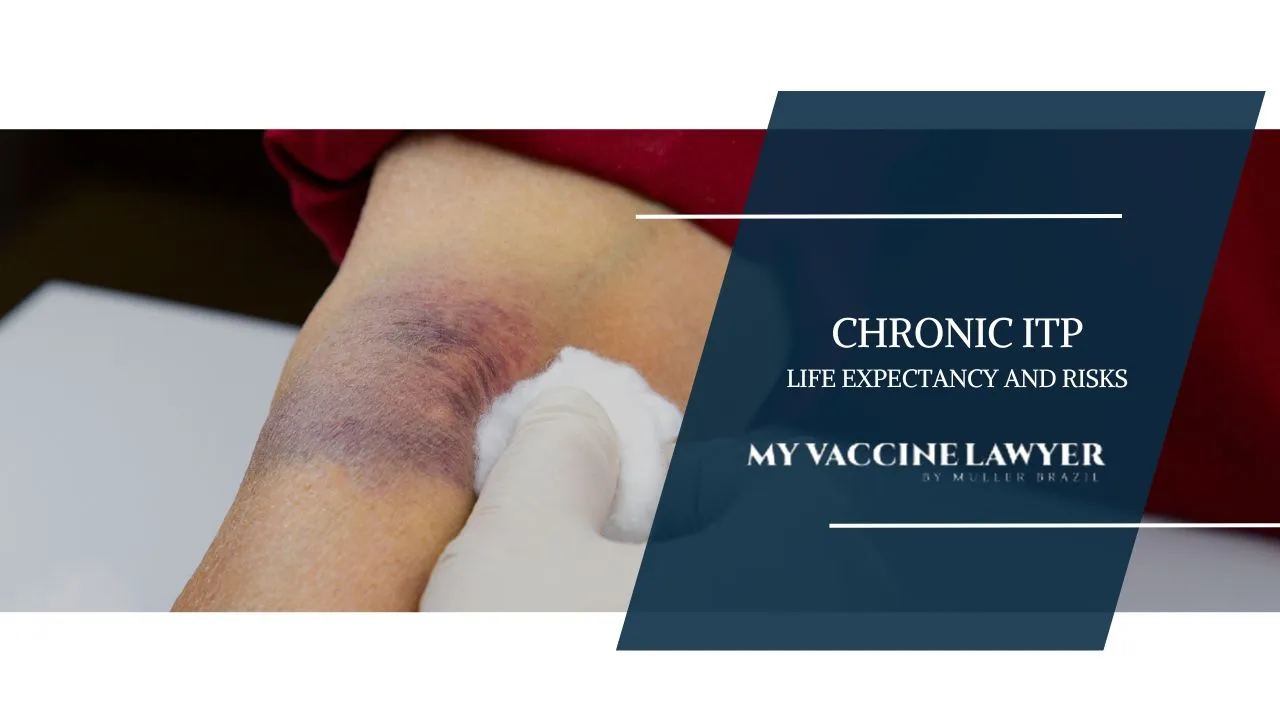Guillain-Barré Syndrome in Children: Symptoms & Treatment
If your child suddenly feels weak or has trouble moving, they might have Guillain-Barre Syndrome (GBS), a serious nerve condition. Catching this...
5 min read
Vaccine Injury Law Resources / Immune Thrombocytopenic Purpura / Chronic ITP: Life Expectancy and Health Risks Explained
 Paul Brazil
:
Oct 5, 2023 12:00:00 PM
Paul Brazil
:
Oct 5, 2023 12:00:00 PM
Immune thrombocytopenic purpura (ITP) is a disorder marked by the immune system's mistaken attack on platelets, which can result in increased susceptibility to bleeding and bruising. If you have chronic immune thrombocytopenic purpura (ITP), it’s important to understand how it can affect your life. Many people with mild or moderate ITP live just as long as others without the condition. However, if your ITP is severe or doesn’t respond to treatments, you might have a higher risk of infections, heart issues, and serious bleeding.
Treatments can help control ITP symptoms and lower these risks, but some can weaken your immune system. Knowing if your ITP is primary (no clear cause) or secondary (caused by another condition) also helps in managing it properly.
Regular visits to your doctor, following your treatment plan, and learning about ITP are important for keeping your condition under control and living a healthy life.
When ITP persists over a longer duration, it is termed 'Chronic immune thrombocytopenia.' A diagnosis, especially of its chronic form, can understandably evoke concerns about the long-term prognosis.
This article aims to shed light on this very concern, incorporating findings from various studies to give readers a clear and comprehensive understanding of what lies ahead for those diagnosed with chronic ITP.
Many face A pressing question upon diagnosis: "Is ITP life-threatening?" Immune thrombocytopenia (ITP) itself is not generally life-threatening for most affected people.
While acute ITP often sees resolution independently or with treatment within half a year, its chronic counterpart can span many years. Remarkably, studies show that ITP patients can live with chronic ITP for decades, a testament found in the research outlined by the National Centers for Biotechnology Information (NCBI). In fact, for those with mild to moderate ITP, their life expectancy parallels those unaffected by the disorder.
However, it's not without its challenges. Elevated risks such as a higher propensity for infections, hemorrhaging, heart diseases, and blood cancer may reduce life expectancy. Moreover, a particular study published by the American Society of Hematology (ASH) Clinical News magazine indicated that patients displaying persistent severe thrombocytopenia and showing no response to therapy within the initial two years exhibit heightened morbidity and mortality.
Compounding these concerns is the subset known as refractory ITP. Characterized by its resistance to standard treatments, refractory immune thrombocytopenic purpura multiplies risks, especially in the face of complications such as severe infections and severe bleeding events, elevating the danger and potentially reducing life expectancy.
The prognosis of immune thrombocytopenia (ITP) can significantly hinge on its cause. Broadly categorized, ITP can manifest as primary or secondary.
Primary ITP, in its distinct nature, emerges without any traceable underlying cause. On the other hand, secondary ITP arises due to another initiating condition or disease.
Influences leading to secondary immune thrombocytopenic purpura cover a spectrum, including certain vaccines, specific medications, or even other autoimmune disorders, as detailed in a study published by the International Journal of Infectious Diseases.
It's noteworthy to highlight the difference in risk between the two types. Those grappling with secondary ITP face a heightened mortality risk compared to their counterparts with primary ITP.
Diving deeper into statistics, a study from Denmark published in Transfusion Journal presented intriguing findings: while primary ITP patients had a median survival rate shortened by 5.1 years compared to the average person, those with secondary ITP faced a more pronounced reduction, with their median survival rate being 11.1 years less than the general populace.
Immune thrombocytopenia (ITP) is a chronic disease that can manifest in children and adults. It is primarily characterized by a low platelet count, which can lead to increased bleeding.
There's a silver lining for children under 10 diagnosed with chronic ITP: they are considerably more likely to experience remission than their older peers. However, with this diagnosis in young ones comes a substantial risk factor: an elevated susceptibility to severe bleeding incidents.
On the other hand, adults present a different trajectory with ITP. Although they generally exhibit lower disease resolution rates compared to children, it's not uncommon for them to manage the condition for several years to even decades.
More specifically, approximately 10% of the adult demographic with ITP finds themselves fortunate, experiencing spontaneous remission within the first half-year of diagnosis. Still, doubts linger for a small fraction of adult patients, particularly those with severe refractory ITP. This subset doesn't resonate well with treatments, leading to no significant response, and consequently, faces a heightened mortality risk, predominantly stemming from complications related to severe bleeding.
When tackling chronic ITP, life expectancy and how treatments might influence it is a pressing concern. Indeed, treatments have proven instrumental in curbing the risk of severe bleeding, a predominant cause of mortality among individuals with chronic immune thrombocytopenic purpura.
By effectively managing chronic ITP symptoms, there's a clear possibility to enhance life expectancy and uplift the overall quality of life. Many treatment options for chronic ITP aim to increase a low platelet count, subsequently alleviating the distressing symptoms accompanying the condition.
However, it's important to approach these treatments with a watchful eye, as they might usher in unwelcome complications for life expectancy. An example is the use of immunosuppressants. While they offer relief by addressing chronic ITP, they weaken the body's ability to fend off infections, which could, in turn, impact overall longevity.
Chronic immune thrombocytopenic purpura, while concerning, is not typically a direct cause of death. Instead, mortality is often attributed to other conditions or complications that may arise in conjunction with it.
Comorbidity is when a condition exists alongside another primary one. For instance, the simultaneous presence of diabetes and chronic ITP exemplifies such comorbidities.
Research illuminates several heightened risks for ITP patients. These risks include infections, blood cancers like leukemia and lymphoma, hemorrhages leading to severe bleeding, and cardiovascular conditions affecting the heart and lungs (source: ASH Publications).
Further, conditions like diabetes and high blood pressure also commonly act as comorbidities, impacting life expectancy for chronic ITP patients. Thankfully, with timely medical intervention coupled with necessary lifestyle changes, these conditions can be effectively managed, offering patients a better chance at a quality life.
Managing chronic ITP involves a consistent, long-term approach to ensure relative maximum well-being. Regular medical consultations, including routine bloodwork and platelet count assessments, stand at the forefront of this management strategy, providing the basis for monitoring chronic idiopathic thrombocytopenic purpura symptoms and fine-tuning treatment protocols. Taking medications as directed and rigorously follow your physician's guidelines is imperative.
Should new chronic ITP symptoms emerge, particularly bleeding or unusual bruising, seeking medical advice without delay is essential. Given the heightened risk of severe bleeding associated with chronic ITP, discussing over-the-counter medication options with your healthcare provider is wise.
Particular caution should be exercised with Nonsteroidal anti-inflammatory drugs (NSAIDs), such as naproxen sodium (Aleve) and ibuprofen (Motrin, Advil), given their potential blood-thinning properties.
Lastly, avoiding contact sports or high-risk activities is advisable, as these might result in severe repercussions, like brain bleeds, for ITP patients.
For those who believe a vaccination has triggered their ITP, there is a pathway to seek compensation.
The National Vaccine Injury Compensation Program (VICP) has been established to assist individuals who have experienced eligible vaccine-related injuries and illnesses. Notably, this program extends its compensation provisions to cover cases where ITP has been linked to vaccinations.
If you or someone you know is navigating the challenges of ITP and suspects a vaccination as its root cause, please don't hesitate to contact us. Offering a free consultation, we stand ready to help you determine your eligibility for compensation and guide you through the process.
Paul Brazil is a native of Dunmore, Pennsylvania and a graduate of Dunmore High School. For his undergraduate education, he attended Bloomsburg University where he majored in political science. He then went on to earn his JD from Widener University School of Law. Following graduation from law school, Mr. Brazil worked at a large Philadelphia civil defense firm where he litigated workers’ compensation claims and Heart and Lung Act cases. In 2012, he joined with his coworker Max Muller to form Muller Brazil.

If your child suddenly feels weak or has trouble moving, they might have Guillain-Barre Syndrome (GBS), a serious nerve condition. Catching this...

If you have a fear of needles, called trypanophobia, you're not alone. This fear can cause severe anxiety and physical reactions, making it difficult...

Getting a vaccine is a routine part of staying healthy, but that doesn’t mean it’s always comfortable. If you've recently received a pneumonia shot,...
